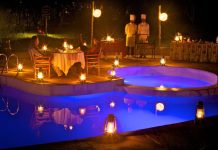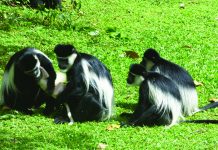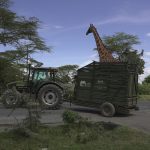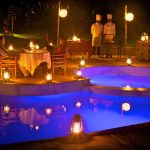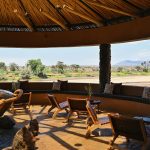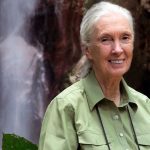By Storm Stanley
Most of the 49 chimpanzees being rehabilitated on Ngamba Island in Uganda by the Chimpanzee Sanctuary and Wildlife Conservation Trust (CSWCT) had never met before, other than three babies born in July 2002, March 2015 and February 2016.
On the whole, they have formed a cooperative community, intermingling contentedly in cohesive groups — complex family and social interactions are essential to all chimpanzees. There is a hierarchy — chimps are known for dominant/submissive social stratification, with high to low ranking members.
Ngamba Island on Lake Victoria was established as a chimpanzee sanctuary in October 1998, starting with 11 Eastern chimpanzees (Pan troglodytes schweinfurthii).
In order to provide a secure home for orphaned and rescued chimps, 100 acres of near pristine forest was purchased with donor seed funding by a partnership of national and international conservation organisations, including the International Fund for Animal Welfare, Born Free Foundation, Jane Goodall Institute, Taronga Zoo, Australia, Uganda Wildlife Education Centre (UWEC), Uganda Wildlife Authority and Ecotrust Uganda.
In the administration block, I read several chimpanzee profiles. Most of the chimps were victims of the illegal live trade in wildlife, and were confiscated from dealers. Three chimps — Masiko, Sunday and Megan were returned from Russia destined for a circus in Moscow. Another four came from war-torn South Sudan — Sara, Medina, Cocoa and Minni.
Nagoti was “locked in a cupboard for three days and arrived dehydrated” Baluku was “found with a rope tied around his waist; which cut deep into his skin. “Locked in the dark for days, Baluku still bears those (physical) scars”. It is the emotional ones, however, that take the longest to heal, according to Innocent, one of CSWCT’s caretakers. Another chimp, Ndyakira, was “confiscated from a hotel in Kampala, and paraded in court as evidence!”
The fate of yet others indicate they were to be used in animal testing labs, and even as exotic pets. They are often traumatised having witnessed their mothers and family units being slaughtered and then kept in isolation chained up in basements or suffocating in deplorable conditions. All of them have a heart-breaking story other than the three youngsters accidentally born on Ngamba Island. The first baby born accidentally on the island is appropriately named “surprise” (Kyewunyo). In fact fertility needs to be strictly controlled so that the chimpanzees do not exceed the carrying capacity of the forested island.
Chimps are reckless with their environment not unlike humans, with whom they share 98.7 per cent of DNA. In their natural environment chimps build a new nest to sleep in every night, while on Ngamba Island they are encouraged to sleep in woven hammocks in several large enclosures so that the Island ecology is not disturbed or
degraded. Today 37 return, another 12 have remained in the forest, including the dominant female, Nkumua rescued in 1997.
Perilously close to extinction
The chimpanzees’ diet is also supplemented with what is available in nature. There are additional food fests in the morning and evening, to lure the chimps out of the forest, and I wait on a shaded viewing platform to watch the animated chimps. Their glossy hair shines in the morning sunlight, intelligent beady eyes stare back at you making eye contact, unnervingly human. With dextrous fingers chimps clasp their snack of fruit or vegetable and scurry away before a more dominant chimp tries to steal it.
While Ngamba Island provides a natural enough habitat for the chimpanzees, the long-term aim is to reintroduce as many of the chimps as possible, in groups of around 10 to new homes in the Ugandan and Tanzanian rainforest, where the Eastern chimpanzee is located. This poses other problems due to diminishing habitat, and fragmented ecosystems, particularly because there are already chimpanzees living in the last few ideal places.
Like all other ape species, chimpanzee numbers continue to plummet in the wild, according to recent estimates. Between 150,000 and 200,000 remain. With numbers declining by as many as 6,000 per year, chimpanzees are classified as ‘Endangered’ on the IUCN Red List.
According to the Global Forest Reporting Network, Mongabay, “agricultural expansion has led to the clearing of primate habitat three times the size of France between 1990 and 2010; impinging on the range of 76 per cent of apes and monkeys, although primates also face serious threats from hunting logging and ranching.”
Gorillas, chimpanzees and orangutans — our great ape cousins — are perilously close to extinction. “It is not much of a secret that we humans have had a lot to do with putting them there,” says John Canon, reporting for Mongabay.
There are three main programmes to the core work of CSWCT, a non-governmental organisation. The main one is the primate welfare programme with long-term management of the Ngamba Island sanctuary for confiscated individuals, which cannot be returned to the wild. Secondary functions include the in-situ conservation of chimps in the wild and conserving natural habitat in unprotected areas, together with engaging local communities. An essential component includes environmental awareness — empowering the youth as agents of change.
Psychological therapy
Core values observed by CSWCT include maintaining the integrity of individual chimps, with the care of each chimp tailored to suit their needs. When a chimp arrives at the sanctuary, he or she is given specialised treatment, which often necessitates psychological therapy, including music and painting.
As the work of CSWCT expands to include protecting the habitats of chimps in the wild, a new programme in Hoima has been set up. Hopefully it is not too late. Lilly Ajarova the executive director for the Trust, who can distinguish one chimp from another, emphasises the point about habitat loss: “The importance of protecting the rainforest, not just for chimps and the wildlife they share their forest with, but for humankind as a provisioning service, water catchment of forested areas is essential and urgent.”
The chimps are initially quarantined for 90 days at the Uganda Education Centre before being transferred to Ngamba Island where they are gradually integrated into the resident sanctuary population. A fully operational veterinary clinic provides specialised care to treat the chimpanzees for human inflicted injuries or wounds received during fights for social dominance or food. The vets also regularly monitor the chimpanzees’ health for respiratory illnesses and provide birth control implants.
Back at the sanctuary, not all of the stories we hear are sad. Inquisitive by nature, just like their human cousins, Sunday nicknamed the Boat Captain, accidentally launched a fishing boat left carelessly close to the shores of Ngamba Island. The startled chimp was rescued before sailing off across Lake Victoria, whose tides and currents can be as capricious as the sea. On another occasion several years earlier, a resident from nearby Nsadzi Island was found fast asleep on Ngamba Island by Sunday. The fisherman startled and afraid jumped into the lake screaming and swam away. It was noted later that the fisherman had been drunk, lost his way in the dark and landed on Ngamba Island the previous night.
Visitor revenue helps to augment donor funding. Open all year round there are two feedings each day, and visitors can interact safely with certain habituated chimps under supervision of the staff. There are four comfortable double tents (10 more mobile tents can be arranged at short notice) to accommodate overnight visitors on Ngamba Island. Note that it is necessary to have certain vaccines if you wish to participate in some of the close interaction caretaking activities with chimps. Details can be obtained from contacts below.
With the dusk birds who inhabit the island, especially water birds, come to roost weaving elaborate paths. These days, Innocent tells me there are more and more birds residing here; surrounding islands show evidence of deforestation and over-grazing. However, as the chimpanzees begin to quieten down, like teenagers after the excitement of a good party, these 49 are safe from a life of exploitation — at least for now.
Website: http://ngambaisland.org,
Facebook: http://www.facebook.com/ngambaisland
Reservations: reservations@ngambaisland.org






